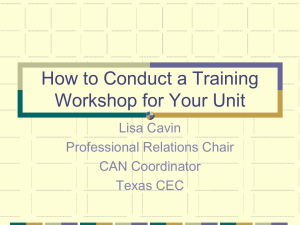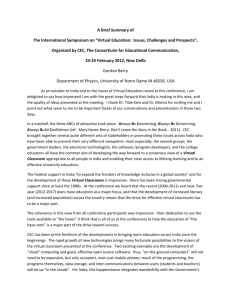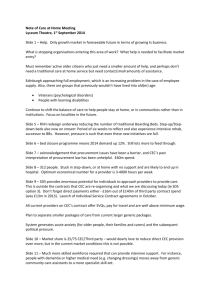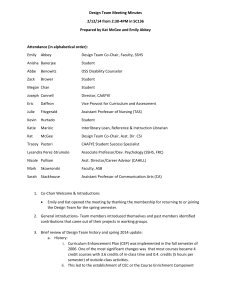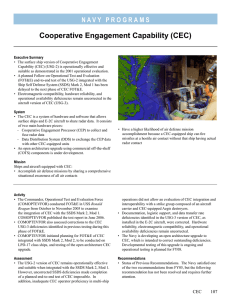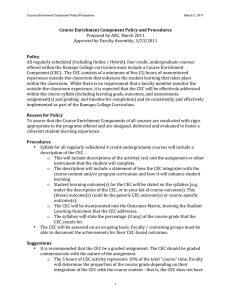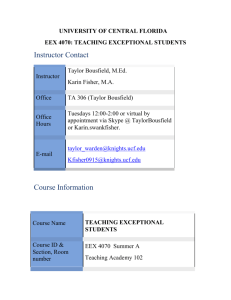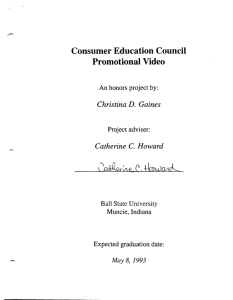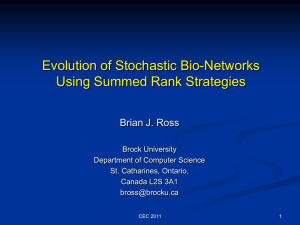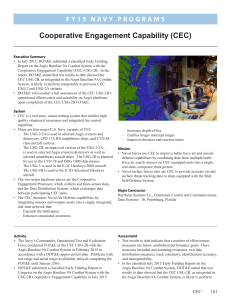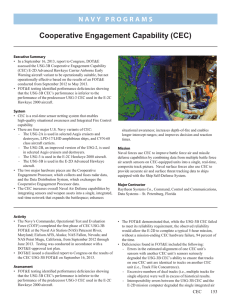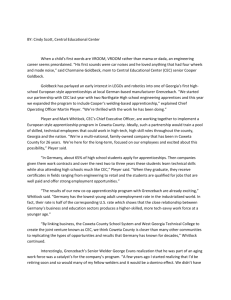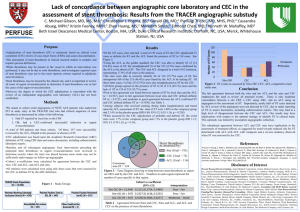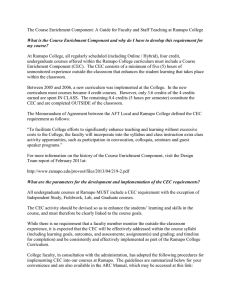Leadership/Business Foundation Possible Courses
advertisement
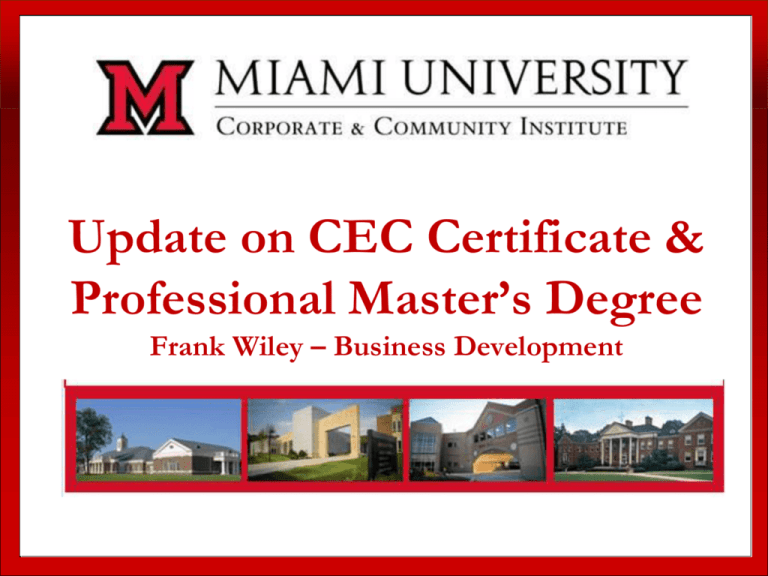
Update on CEC Certificate & Professional Master’s Degree Frank Wiley – Business Development Introduction Executive Summary The concept for the C&PM program came from the Council of Graduate Schools’ recommendation for Professional Science Master’s programs. The PSM combines graduate-level technical training with a business education, to allow STEM graduates to further their careers in corporate and government roles. Planning Team • CEC: Doug Troy and Tim Cameron • Corporate & Community Institute (CCI): Pat McNab and Frank Wiley Research • • • • • Benchmarked competitive programs in the SW Ohio Reviewed Miami PMBA strategy Interviewed seven universities with PSM degrees Interviewed twelve CEC Advisory Council Members Contacted 1,500 CEC alumni in SW Ohio, with104 completing an online survey Survey Results • 94% felt that it was important or very important for engineers to have business training • 66% of companies offer tuition reimbursement for MS degrees, with 69% of those paying full tuition • Nearly 70% of respondents have taken professional development classes, like those from CCI • More than half the companies offer both tuition support and time off for these type of classes • Responses from: – CEC Advisory Council – Air Force Research Lab, Convergys, Messer & Schlumberger – Major corporations - P&G GE, Kroger and IBM Non-STEM Requirements Non-STEM Requirements Timeline and Next Steps • 2013 – 2015 Certificate programs and planning – Offer certificate programs to test the market – Identify 5 corporate partners to help us define the master’s program and form Advisory Board – Develop master’s curriculum and instructors – Advertising campaign • 2016 Launch master’s program – Location convenient to Cincinnati / Dayton corridor Certificate Programs • Structure of certificate programs – Four to six per semester – One to three days in length – Prices range from $400 to $1,200 • Topics – Fall 2013: Strengths-Based Leadership; Digital Marketing; Project Management – Spring 2014: Lean/Six Sigma/Agile – Others: Business communication; Finance for non-financial managers Proposed Master’s Structure • Complete in 2 years – Classes meet 6:00 – 9:30, 2 days per week, one day per course – 3 “semesters”: fall (2 courses), spring (2 courses), summer (1 course) – 10 courses (30 credit hours) total – Concierge services: meals, books, registration, etc, provided; Courses offered VOA or onsite • Curriculum – Foundation: Leadership and Business (5 courses) – Technical Concentration (4 courses) – Capstone Project related to individual’s career (1 course) Proposed Master’s Curriculum Capstone Project Technical Technical Technical Technical Concentration 1 Concentration 2 Concentration 3 Concentration 4 LEADERSHIP / BUSINESS Foundation Proposed Master’s Curriculum Possible Technical Concentrations Computing Concentration: Cyber Security • Defense • Detection • Response • Intelligence Engineering Concentration: Mechanical and Manufacturing • Automation and Advanced Manufacturing • Modeling and Simulation of Engineering Systems • Nonlinear Dynamics • Advanced Vibrations Leadership/Business Foundation Possible Courses - 1 • Leadership Skills – – – – Personal leadership Team leadership Strategic leadership Creativity • General Business Overview – Understanding business organization/structure – Finance for non-financial managers – Introduction to marketing Leadership/Business Foundation Possible Courses - 2 • Business communication – Technical writing – Non-technical writing – Presentation skills • Thinking skills – Critical thinking – Creative thinking – Problem solving Leadership/Business Foundation Possible Courses - 3 • Finance and Accounting – – – – Financial planning and analysis Accounting fundamentals Budgeting Financial modeling • Business strategy – – – – Business growth Marketing Entrepreneurship Decision Analysis Leadership/Business Foundation Possible Courses - 4 • Organizational excellence – Project management – Lean / Six Sigma – Agile • Information Technology – – – – Analytics Infrastructure Security Mobility Financial Estimates 2013 CEC Revenues ($K) Certificate Income $750/Class Tuition @ $750/CH State Subsidy ($8100/FTE) Corporate Sponsorship TOTAL REVENUE CEC Expenses ($K) Instructors ($1,500 per class) Faculty ($15K/course + 40% benefits) Staff (MCCI) Advertising Partner Benefits General Program Operations VOALC Room rentals (1%) Books/Materials ($175/student/course) TOTAL COST CEC Surplus / (Deficit) Going Basis 2015 2016 2017 2018 2019 3 20 0 0 0 0 0 0 0 5 20 0 0 0 0 0 0 0 7 20 2 10 20 10 60 180 6 9 20 4 10 40 20 120 360 12 10 20 6 15 90 45 270 810 27 10 20 6 15 90 45 270 810 27 10 20 6 20 120 60 360 1080 36 $45 $0 $0 $75 $0 $0 $105 $135 $49 $135 $270 $97 $150 $608 $219 $150 $608 $219 $150 $810 $292 $45 $75 $289 $502 $976 $976 $1,252 $8 $0 $50 $50 $5 $0 $1 $0 $113 $11 $126 $75 $100 $5 $25 $3 $7 $352 $14 $252 $100 $100 $5 $50 $5 $19 $544 $15 $378 $100 $100 $15 $378 $100 $100 $15 $378 $100 $100 $24 $5 $0 $25 $25 $5 $0 $0 $0 $60 $50 $10 $32 $684 $50 $10 $32 $684 $50 $13 $32 $687 $0 $15 $38 $63 $42 $292 $292 $565 Assumptions Certificates per Semester Students/Class PM classes per semester Students/Class Classroom Totals/Semester PM Enrollment Semester Credit Hours Annual Credit Hours Student FTE $24 $24 $24 2014 Partnership Support & Benefits • Create Advisory Board/Sponsors – Define foundation courses & technical concentrations – Help identify instructors – Shape the curriculum for your needs • Provide Financial Backing – Five partners to fund development in spring 2014 – $10,000 per year for first two years • Other Benefits to Partners – – – – – Access to graduates & interns / CEC Centers Three on-campus Company Events Reserved seats in Certificate programs Opportunities to lecture in classes Reduced-cost onsite courses Please complete our survey in your packet and drop off at the door! wileyfn@MiamiOH.edu troyda@MiamiOH.edu
